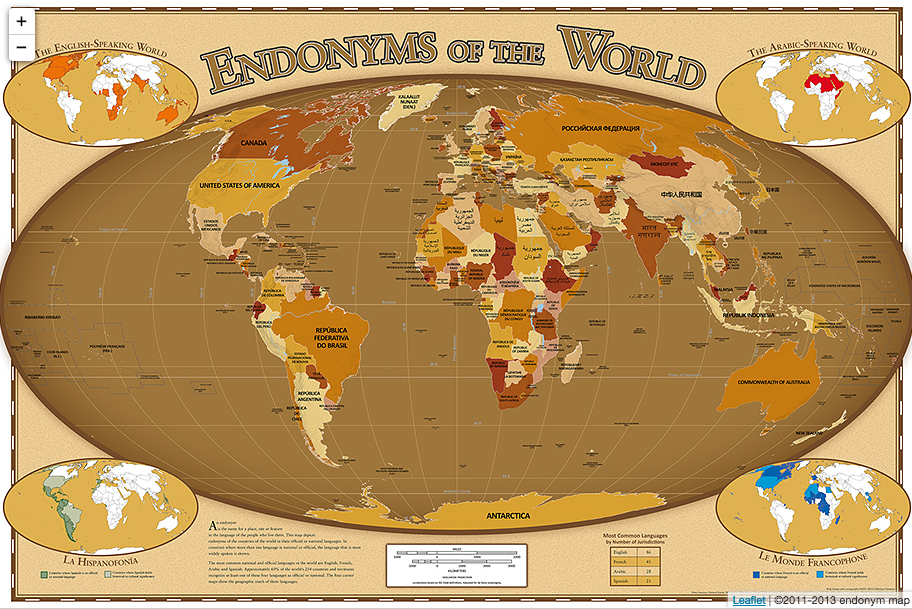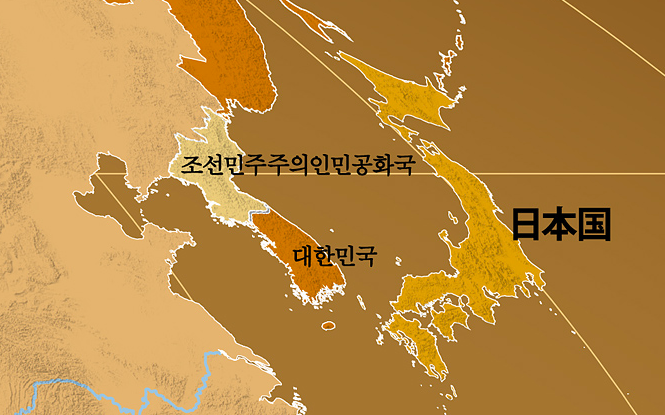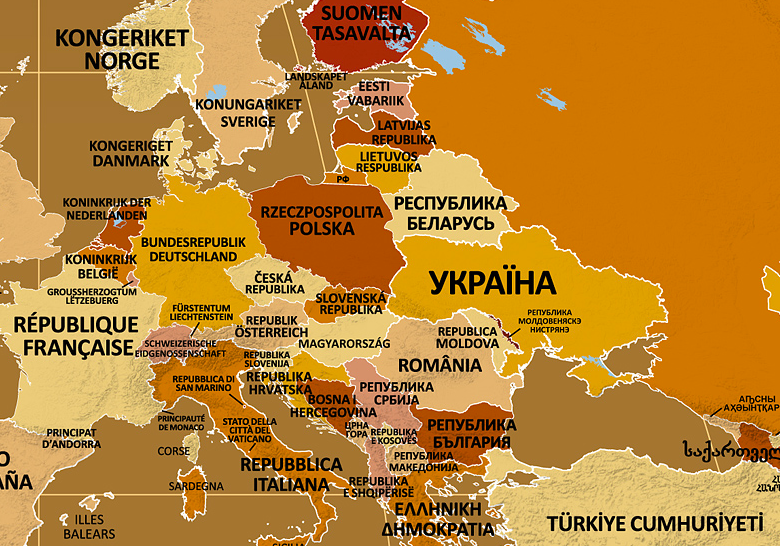
I live in South Korea, but the South Koreans don’t call it South Korea. The country has its own language, of course, and that language has its own name for the country, daehan minguk (대한 민국), or more commonly hanguk (한국) — not that it stops the global branding-friendly letter K, which has made its way from “K‑pop” to “K‑beauty” to even (albeit much less successfully) things like “K‑food.” As far as our much-reported-on northern neighbor, South Koreans call it bukhan (북한), but its inhabitants call their land joseon minjujueui inmin gonghwaguk (조선민주주의인민공화국). And as with Korea South and North, so with every country in the world: each one has an endonym.

“An endonym is the name for a place, site or location in the language of the people who live there. These names may be officially designated by the local government or they may simply be widely used.” So says the front page of the Endonym Map, which labels every country (or disputed territory) in the world with its endonym, written in the language’s own script.
When you first learned the names of foreign countries, you actually learned their exonyms, their names in a foreign language: yours. “South Korea” and “North Korea” are exonyms, as are names like “Japan,” “Finland,” “Turkey,” and “France.” Nihon-koku (日本国), Suomen tasavalta, Türkiye Cumhuriyeti, and la République française all appear on the Endonym Map, as do many other well-known countries you might at first glance assume you’ve never heard of.

The map’s creator notes that “the most common official or national language in the world is English, with 86 countries or territories,” which represents “one-third the number of total countries and approximately 30% of the planet’s land area.” Because of that, people all over the world do tend to know the English exonym for their own country, but that’s hardly an excuse not to learn its real name should you decide to pay them a visit. And that counts as the first step toward actually learning its language, a journey that the Foreign Service Institute’s language-learning map we featured last year can help you plan. Hwaiting, as we say here in the Koreanized English — or Englishized Korean? — of hanguk.
You can view the Endonym Map in a larger, zoomable format here.
Related Content:
The Favorite Literary Work of Every Country Visualized on a World Map
A Map Showing How Much Time It Takes to Learn Foreign Languages: From Easiest to Hardest
1934 Map Resizes the World to Show Which Country Drinks the Most Tea
“Every Country in the World”–Two Videos Tell You Curious Facts About 190+ Countries
Based in Seoul, Colin Marshall writes and broadcasts on cities and culture. His projects include the book The Stateless City: a Walk through 21st-Century Los Angeles and the video series The City in Cinema. Follow him on Twitter at @colinmarshall or on Facebook.


No it doesn’t. Or maybe if you separate the country from the people… I don’t think the people usually call their country “the republic of” or something like that. I would have preferred a map that shows what the people call their countries (in their majority language at least). I’m finnish and it wouldn’t occur to me that my country is called “Suomen Tasavalta” (“the finnish republic”) as it would obviously be just Suomi to all finnish speakers.
It’s strange that the name of Belgium (België) only is writhen in Dutch (or Flemish or Nederlands), while Belgium has 3 (three) official languages: Dutch, French and German..
Dutch is also spoken in The Netherlands and a (very small part) of France.
French is not only spoken in France but also in Belgium, Luxemburg and Switzerland. And a small part of Italy.
and German is spoken.….is Germany, Switzerland, Austria and even a small part of …Italy.
The European borders are not the borders of languages, not the borders of different people but the borders of conflicts & wars, politics & marriages, forgotten kingdoms and fallen republics.
Your map is incorrect.
New Zealand is indigenous know as Aotearoa… please correct. Thanks
I was excited to travel to and around Bhutan, hoping, among other things, to settle once and for all its pronunciation, Boo-tan or Boo-tahn? The Bhutanese call their country “Druk.”
like google
It’s disappointing that Éire is labelled only as “Ireland”. The country has two official languages, and streets and towns are sign-posted in both.
Tá sé díomách nach bhfuil Éire lipéadaithe ach mar “Ireland”. Tá dhá theanga oifigiúil ag an tír, agus tá sráidbhailte agus bailte araon ainmnithe sa dá theanga.
I agree with Petteri’s message. While some of the endonyms may be the legal name of the government for those countries, almost no one would identify their homeland that way. Germans just call Germany “Deutchland” in normal parlance, and the French call their country “la France”. If someone, especially a non-native language traveller, were to go around these places constantly calling them “la Républic Française” or “Bundesrepublik Deutchland” the locals would soon put such a person down as a pompous idiot! Secondly, it seems to me that the point of a website is communication. This website is (mostly) in the English language, as so apparently is intending on communicating the endonyms of countries to English speakers. If that is the intent, it helps those speakers not a bit to render the names in Cyrillic or Arabic script. How is someone, whose native written language uses Latin characters, to gain any useful information from words written in characters that they can’t read. If an English speaker is visiting Egypt, it helps them to know Egyptians call their country “al Misr”. Confronted with “مصر”, however, with no experience with Arabic script, they will just give up. If you want these endonyms to be useful to the people who read your site in the language it’s primarily written in, I suggest you render the endonyms in Latin characters to make it legible to users.
Good comments. Very interesting. I agree with all of them.